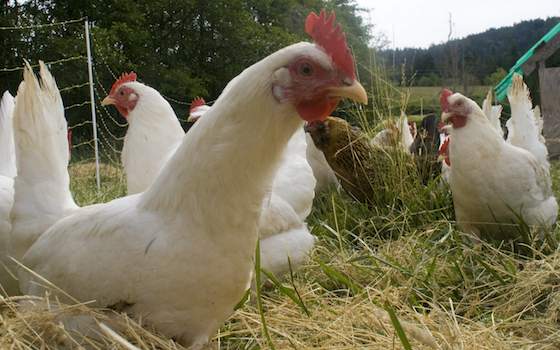- MENU
- HOME
- SEARCH
- WORLD
- MAIN
- AFRICA
- ASIA
- BALKANS
- EUROPE
- LATIN AMERICA
- MIDDLE EAST
- United Kingdom
- United States
- Argentina
- Australia
- Austria
- Benelux
- Brazil
- Canada
- China
- France
- Germany
- Greece
- Hungary
- India
- Indonesia
- Ireland
- Israel
- Italy
- Japan
- Korea
- Mexico
- New Zealand
- Pakistan
- Philippines
- Poland
- Russia
- South Africa
- Spain
- Taiwan
- Turkey
- USA
- BUSINESS
- WEALTH
- STOCKS
- TECH
- HEALTH
- LIFESTYLE
- ENTERTAINMENT
- SPORTS
- RSS
- iHaveNet.com: Recipes

by Lori Zanteson
What does "cage-free" really mean? Learn the facts about egg labeling, ethical farming, and whether cage-free eggs are worth the cost.
Eggs used to be so simple. Shoppers could choose between extra-large or medium and brown or white. Today's supermarket egg case offers an array of selections, like organic, natural, and free-range, but cage-free has been getting extra attention.
Caged hens
Most eggs sold in supermarkets and used in the production of other foods come from caged hens. These cages house five to seven hens each, leaving a tight space for hens to live in and lay their eggs. Confined quarters make natural chicken behaviors such as perching, scratching for insects and nesting impossible. Animal welfare proponents say preventing these natural behaviors is cruel and causes stress that makes hens more vulnerable to disease.
Cage-free hens
The increase in public opposition to caged hens has caused a growing number of producers to turn to cage-free systems. Most cage-free hens live inside large barns in flocks of several thousands. They are free to walk, perch and lay their eggs in nests, but are most always kept inside. While quality of life is much improved, both cage and cage-free systems practice some less than humane treatments, such as killing male chicks upon hatching, burning beaks off, and slaughtering at less than 2 years old.
Cage-Free vs. Free-Range vs. Organic Eggs
Cage-Free: Hens are not kept in cages but remain indoors.
Free-Range: Hens have access to the outdoors, though the amount and quality of outdoor time varies.
Organic: Hens are raised on organic feed without antibiotics and usually have outdoor access.
Are Cage-Free Eggs Better?
While cage-free eggs improve hen welfare compared to conventional caged eggs, they are not the same as pasture-raised eggs, where hens have extensive outdoor access. Choosing cage-free eggs is a step toward more ethical consumption, but it's important to understand what the label truly means.
How to Choose the Best Eggs
When shopping for eggs, look for certifications such as Certified Humane or USDA Organic to ensure higher welfare standards. If you're concerned about the environment and animal welfare, researching the farm's practices can help you make an informed decision.
Egg safety
Food safety measures for U.S. egg farmers are meant to protect against food-borne illness. However, the safety of caged systems, specifically the threat of salmonella contamination, has been questioned. While research by the
The choice is up to you
Several factors may influence the decision between caged and cage-free eggs. It really comes down to what's most important to the consumer. If cost is a consideration, cage-free eggs are more expensive because of higher production and lower volume per farm. Nevertheless, supporting a more humane treatment of hens may be a priority. Be aware, however, that the type of housing does not affect the nutrient content of eggs. That is determined among hen breeds, and by the type of feed. A scanning of egg labels will reveal eggs laid by hens with specific diets, such as higher omega-3 feed, may produce more nutritious eggs.
Egg labels defined
Cage free
Hens roam freely in an indoor barn or building, which allows natural behaviors, and unlimited access to food and water. Beak cutting is permitted.
Free range
Free-range hens live uncaged inside barns with continuous outdoor access. Beak cutting and forced molting through starvation are allowed.
USDA organic
Hens are uncaged, with some outdoor access, the duration of which is not defined. They are fed an organic vegetarian diet free of antibiotics, hormones and pesticides. Beak cutting and forced molting through starvation are allowed.
Natural
The USDA requires meat, poultry and egg products labeled "natural" to be minimally processed and have no artificial ingredients. On egg cartons, this label has not meaning related to farm practices.
Omega-3
Hens are fed fish or flaxseed, but this label has no relevance to animal welfare.
Animal Welfare Approved
Hens are cage free with open outdoor perching access. Natural molting is mandatory and beak cutting is prohibited. Not USDA regulated.
Final Thoughts
Cage-free eggs offer a more humane alternative to conventional eggs, but they are just one option among many. Understanding egg labels can help you make the best choice for your health, ethics, and budget.
Subscribe to Receive our Gourmet Recipes
FOOD, DRINK & RECIPES [...]
APPETIZERS | SOUPS | PASTA | SALADS | MAIN COURSES | SEAFOOD | CHICKEN | PORK | LAMB | BEEF / VEAL | VEGETARIAN | SIDE DISHES | DESSERT | HEALTHY | WOLFGANG PUCK
Cage-Free Eggs: What You Need to Know
What are cage-free eggs, and are they worth it? Learn the truth behind cage-free labels, ethical farming, and what to look for when buying eggs.
Article: Copyright ©, Tribune Content Agency